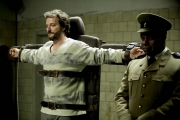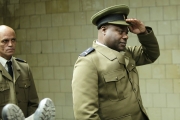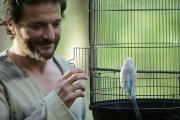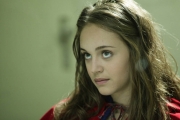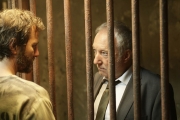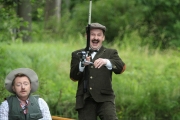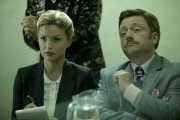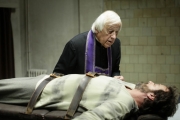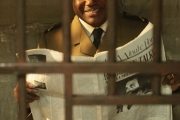![]() Presentation by and discussion with director and actor Patrick Ridremont & actor Jean-Luc Couchard
Presentation by and discussion with director and actor Patrick Ridremont & actor Jean-Luc Couchard
William Lamers, 40 years of age, an anonymous criminal condemned to death for murder, is about to be executed. The procedure is taking place in general indifference: neither the family of the sentenced, nor his victims’ attend the execution. Only a journalist from a cheap local tabloid is present to witness the “show.” However, what should typically be a routine and banal procedure rapidly evolves into an absolute nightmare for Karl Raven, the director of the prison. When asked if he has any last words, the condemned begins to talk. Very quickly, this story becomes a political issue and attracts a lot of media attention. And everyone becomes mesmerized by the story of this condemned man turned into a modern Scheherazade.
Cast & Crew
Director • Patrick Ridremont
Screenwriters • Patrick Ridremont and Jean-Sébastien Lopez
Producers • Serge de Poucques, Sylvain Goldberg, Lilian Eche, Christel Henon
Starring :
Patrick Ridremont, Jean-Luc Couchard, François Berléand, Virginie Efira, Christian Marin…
Choose a picture to see the filmography (source : IMDB)
![]()
Patrick, what is your account of the film?
No need to be scared to set the stage: the film is taking place in a disused prison and is the story of a criminal sentenced to death. He is the only inmate in the place. With him, there is only the director, a guard, a nurse. Not a lot of people. The show is running late. The director is in a rush. Legal procedure is being followed, but each of them would like for things to come to an end as rapidly as possible. The priest is a bit late; the nurse is hard of hearing and clumsy. The execution, scheduled to begin at 8pm, starts at ten past the hour. When asked if he has any last words, the condemned begins to talk, and talks, talks, talks. He stops. All are checking their watches, ready to give the go ahead to the executioner. But the man starts to speak again. The director would really like him to stop, but it is believed that the law does not authorize cutting short the last words of a man sentenced to death. As long as the prisoner is speaking, the execution cannot take place. So, the prisoner is allowed to keep talking. At midnight, he is taken back to his cell to be brought out again the following evening at 8pm. Very quickly, this story becomes a political issue and attracts a lot of media attention. And everyone becomes mesmerized by the story of this condemned man turned into a modern Scheherazade. Each day between 8 pm and midnight, he has power; he has the attention of everybody and he is not going to deprive himself of it.
How could you describe the film?
It is a tragic fable, with a lot of humor in addition. There is a real dramatic tension. The subject is dreadful: this man is about to be put to death. This is nothing to laugh about. But at the same time, we dare to introduce a completely opposite character: a grotesque governor who understands nothing about anything. It makes you laugh, but may be in order not to cry. Moreover, there is the context: it is never defined. Where are we? What is this prison with just one prisoner? And this surrounding park? We are nowhere, yet everywhere. This is the characteristic of a fable.
Your film is completely original, but its duality laughter/teeth-grinding is very Belgian. Therefore, when viewing your film, one cannot avoid thinking of the first films of the Coen brothers.
It is very clearly a reference for me. Personally, I wanted the codes to be clear and evident. That is what you find in the work of the Coen brothers: the bad guys look mean and the hunks look good. No ambiguity. I have the same objective: I wanted the governor to be very dumb and the prison director very cynical. From there, the talent of the comedians, the subtleties and nuances they impart onto these characters do the rest. But for me, as an author, I wanted very clear guiding lines and definite artistic stances.
In addition to directing your first full-length feature film, you have decided to play the main part as well. Was that ever a very stressful challenge?
At a specific moment, the challenge did feel a little overwhelming. There was therefore no real wavering on my part, but a quite natural moment of hesitation and self-questioning. Can I do both? Should I direct? Should I act instead? But it did not last long. I believe that there is fair wind only for those who know where they are going. So, at a certain point, you have to tell yourself, OK, I do what I feel like doing and I give myself the means to succeed.
Once a decision is made, one has to win the bet. How did you manage to complete this task successfully both in front and behind the camera?
Actually, everything came together quite easily. We had an understudy who knew my lines. I would frame the scene while this understudy would give the cues to the other actors. This way, I was able to oversee everything, and resolve any issue. The understudy would keep the acting rhythm and tone – which is a rather unrewarded task since he played my part from beginning to end and yet never actually appear in any shot. Once everything was in place, he would disappear and I would take his place. Once I was an actor again, I would rely on my artistic advisor, Coralie Closon, who has always been very direct with me. She would just come up and say: “this is not any good” or on the contrary: “perfect, you hit the nail right on the head!” I also had my producer Sylvain Goldberg, who is always paying close attention to details, as well as actor François Berléand, who put so much effort into this film.
Is Dead Man Talking a tough sell?
Some people will probably think so, but it is quite the contrary in fact (he laughs). This is an atypical film, so you cannot put a label on it. It is also a genre film. These are already some good reasons to want to watch it.
Press Kit “Dead Man Talking”
French ~ 16 pages ~ 2,3 Mo ~ pdf




